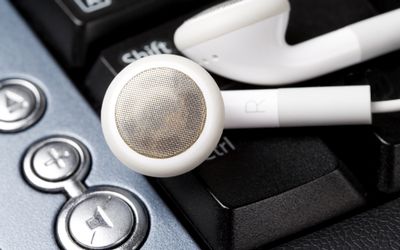Spotify reaches settlement on royalty payment issue
by Agency Staff,
2016-03-18 15:23:30.0
NEW YORK — Spotify, the leader in the booming streaming industry, on Thursday reached a settlement to improve royalty payments to US music publishers as the company hopes to avoid potentially costly lawsuits.
The National Music Publishers’ Association, which advocates on behalf of the US houses that hold songwriters’ copyright, announced the deal that relates to songs whose authors have been difficult to identify.
Amid the rapid growth of streaming, which allows unlimited on-demand music, Spotify has faced charges that it paid little attention to ensuring proper payment of royalties, which go both to performers and the often more anonymous songwriters.
Although songwriter credit on modern commercial music is easily obtained, the details are often missing or incorrect on the digital files for obscure or older songs.
Under the agreement, the Swedish company said it would put forward to publishers a pool of money it has stored for previous unmatched royalties and add to it a "large bonus compensation fund". A joint statement did not specify the amount. A person familiar with the deal said on condition of anonymity that Spotify’s existing pool was $16m and that it was adding another $5m.
Spotify and the music publishers committed to building a database to match streamed songs to their writers more consistently.
"As we have said many times, we have always been committed to paying songwriters and publishers every penny," Spotify spokesman Jonathan Prince said.
David Israelite, the president of the publishers’ association, pledged to keep pushing "digital services to properly pay for the musical works that fuel their businesses".
"After much work together, we have found a way for Spotify to quickly get royalties to the right people," he said.
David Lowery, best known for leading the alternative rock bands Cracker and Camper Van Beethoven, filed a $150m lawsuit in December alleging that Spotify had systematically infringed on copyright in its rush to upload a vast music library.
He wants a US judge to declare a class action lawsuit in which all aggrieved artists could claim royalties from Spotify.
Lowery’s lawyer Mona Hanna criticised Thursday’s agreement as an attempt by Spotify to limit its liability "in secret, without court oversight" and questioned the deal’s enforceability.
"Thousands of songwriters have been harmed by Spotify, and a class action is the best way to protect their songs and their livelihood," said Hanna, a managing partner at firm Michelman and Robinson.
Songwriter Melissa Ferrick in January also filed a $200m class action lawsuit against Spotify on slightly different legal grounds.
Individual publishers, which range from major players to small artist-run imprints, will have to choose whether to enter the deal or back one of the lawsuits.
Under the agreement, Spotify will send a royalty check for all songs it cannot match back to the group of publishers — but only those that take part in the deal.
The joint statement did not specify how the money would be divided among the publishers.
Spotify will keep paying normal royalties to publishers regardless of whether they agree to the settlement.
The private company, which is estimated to be worth more than $8bn, says it has paid back more than $3bn in royalties since its launch in 2008.
Critics, notably pop superstar Taylor Swift, disapprove of Spotify’s advertising-backed free tier through which three-quarters of its more than 75-million users listen without paying.
Spotify and the publishers’ group voiced confidence that the deal would benefit the entire industry as identification problems were not unique to Spotify.
AFP

Picture: THINKSTOCK
NEW YORK — Spotify, the leader in the booming streaming industry, on Thursday reached a settlement to improve royalty payments to US music publishers as the company hopes to avoid potentially costly lawsuits.
The National Music Publishers’ Association, which advocates on behalf of the US houses that hold songwriters’ copyright, announced the deal that relates to songs whose authors have been difficult to identify.
Amid the rapid growth of streaming, which allows unlimited on-demand music, Spotify has faced charges that it paid little attention to ensuring proper payment of royalties, which go both to performers and the often more anonymous songwriters.
Although songwriter credit on modern commercial music is easily obtained, the details are often missing or incorrect on the digital files for obscure or older songs.
Under the agreement, the Swedish company said it would put forward to publishers a pool of money it has stored for previous unmatched royalties and add to it a "large bonus compensation fund". A joint statement did not specify the amount. A person familiar with the deal said on condition of anonymity that Spotify’s existing pool was $16m and that it was adding another $5m.
Spotify and the music publishers committed to building a database to match streamed songs to their writers more consistently.
"As we have said many times, we have always been committed to paying songwriters and publishers every penny," Spotify spokesman Jonathan Prince said.
David Israelite, the president of the publishers’ association, pledged to keep pushing "digital services to properly pay for the musical works that fuel their businesses".
"After much work together, we have found a way for Spotify to quickly get royalties to the right people," he said.
David Lowery, best known for leading the alternative rock bands Cracker and Camper Van Beethoven, filed a $150m lawsuit in December alleging that Spotify had systematically infringed on copyright in its rush to upload a vast music library.
He wants a US judge to declare a class action lawsuit in which all aggrieved artists could claim royalties from Spotify.
Lowery’s lawyer Mona Hanna criticised Thursday’s agreement as an attempt by Spotify to limit its liability "in secret, without court oversight" and questioned the deal’s enforceability.
"Thousands of songwriters have been harmed by Spotify, and a class action is the best way to protect their songs and their livelihood," said Hanna, a managing partner at firm Michelman and Robinson.
Songwriter Melissa Ferrick in January also filed a $200m class action lawsuit against Spotify on slightly different legal grounds.
Individual publishers, which range from major players to small artist-run imprints, will have to choose whether to enter the deal or back one of the lawsuits.
Under the agreement, Spotify will send a royalty check for all songs it cannot match back to the group of publishers — but only those that take part in the deal.
The joint statement did not specify how the money would be divided among the publishers.
Spotify will keep paying normal royalties to publishers regardless of whether they agree to the settlement.
The private company, which is estimated to be worth more than $8bn, says it has paid back more than $3bn in royalties since its launch in 2008.
Critics, notably pop superstar Taylor Swift, disapprove of Spotify’s advertising-backed free tier through which three-quarters of its more than 75-million users listen without paying.
Spotify and the publishers’ group voiced confidence that the deal would benefit the entire industry as identification problems were not unique to Spotify.
AFP





















Change: 1.19%
Change: 1.36%
Change: 2.19%
Change: 1.49%
Change: -0.77%
Data supplied by Profile Data
Change: -0.19%
Change: 0.69%
Change: 1.19%
Change: 0.00%
Change: 0.44%
Data supplied by Profile Data
Change: 0.62%
Change: 0.61%
Change: 0.23%
Change: 0.52%
Change: 0.12%
Data supplied by Profile Data
Change: -0.21%
Change: -1.22%
Change: -0.69%
Change: -0.51%
Change: 0.07%
Data supplied by Profile Data